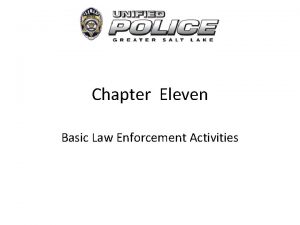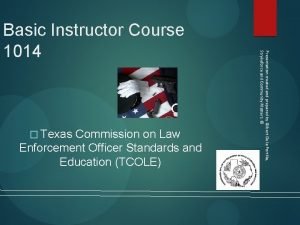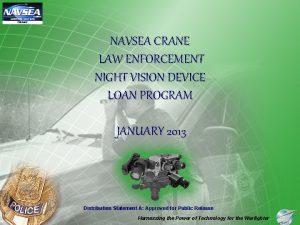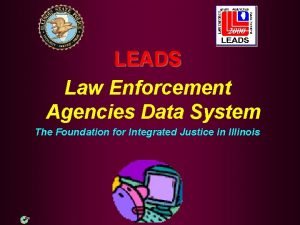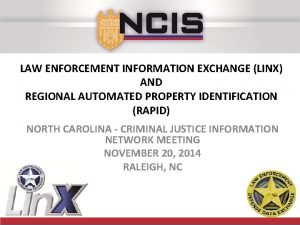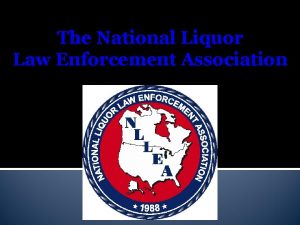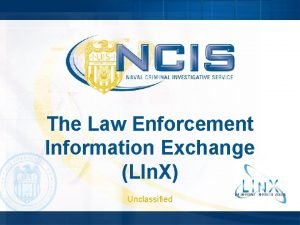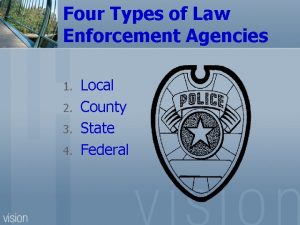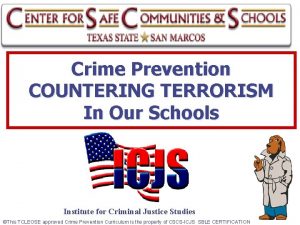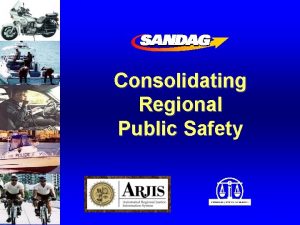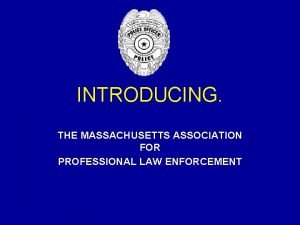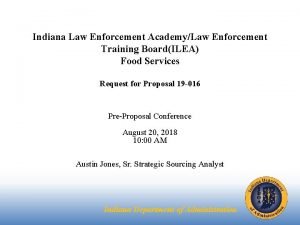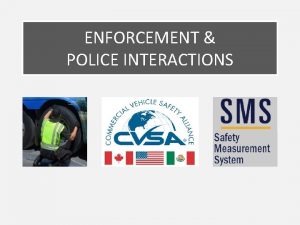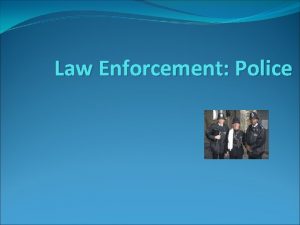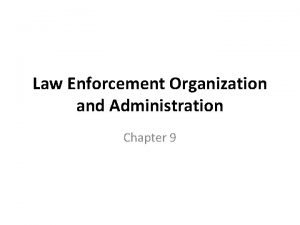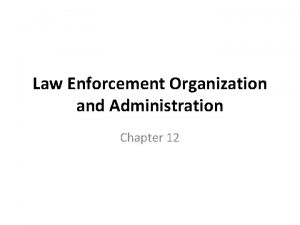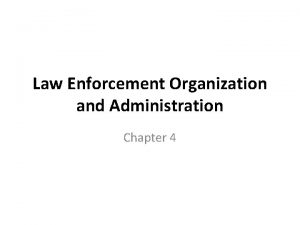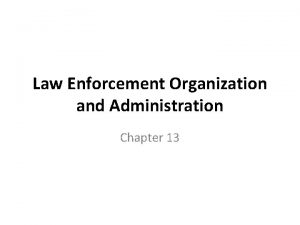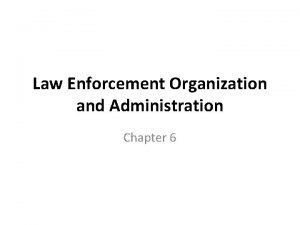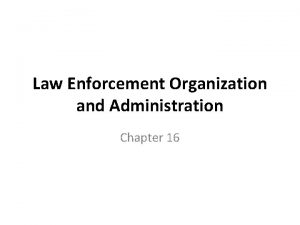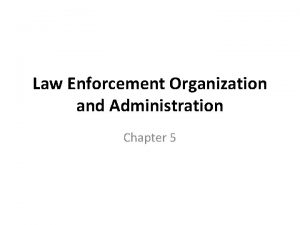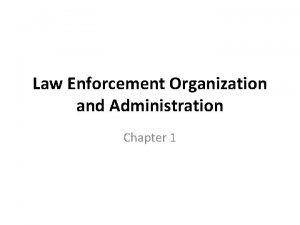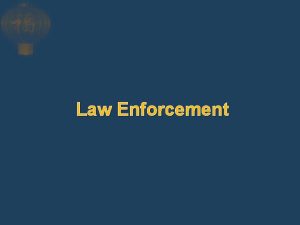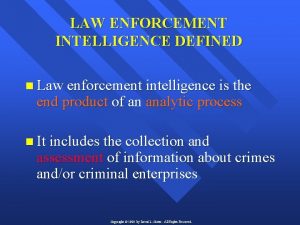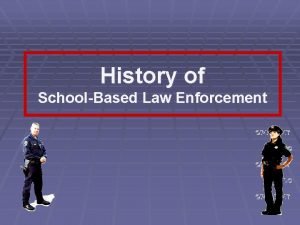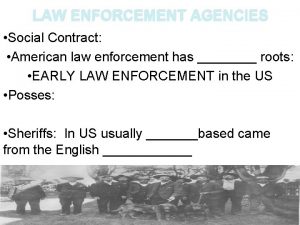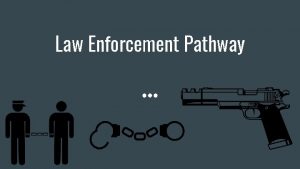Law Enforcement Organization and Administration Chapter 2 Police

















- Slides: 17

Law Enforcement Organization and Administration Chapter 2

Police Culture • Culture – is that complex whole which includes knowledge, belief, art, morals, law, custom, and other capabilities and habits acquired by man as member of a society.

Police Subculture • Subculture – a group that shares in the overall culture of the society but also has its own distinctive values, norms, and lifestyle. • Major norms of police subculture – Secrecy – Solidarity – Social Isolation

Secrecy • Central to police culture. • Police handle many sensitive matters that deal with peoples reputations which can be destroyed if sensitive information is made public. • Those who violate may encounter loss of friends, ostracism, and shortage of back up in dangerous encounters.

Solidarity • Loyalty to and among the police group • Police are never alone • Depend on one another for support, social life, private friendships

Social Isolation • Perception of hostile public makes police officer feel alone. • Police officers tend to socialize with other police officers

Characteristics of Police Sub Culture • Argot Esoteric knowledge – Police sub culture has it own exotic internal language which is used as shorthand for rapid communication among its members. • Police have special training that is germane to their job • Cynicism

Cynicism • Pseudo-cynicism – Occurs at the recruit level and is an attitude that “barely conceals the idealism of commitment beneath the surface. ” • Romantic cynicism – comes within the first five years of the career • Aggressive cynicism – 10 year markresentment and hostility are evident • Resigned cynicism – Officer accepts the flaws in the system.

Internal Sanctions • Peer Group Pressure concerning loyalty to the police profession is enormous and overwhelming.

Informal Group Structures • Typical social groups that exist in an influence police in a department influence include fraternal organizations, ethic groups, sport teams and extended kinship groups.

Psychological Distance If a police officer becomes too emotionally involved with a victim or citizen he or she is not able to objective decisions. Text example: A police officer encounters and old high school friend he may have to arrest. How do you keep your integrity and live with yourself? The answer: Police officers have few civilian friends and become part of the isolated vocational subculture.

Police Corruption and Internal Norms • Corruption cannot exist without the active cooperation of top police officials and major figures in the political hierarchy. • Studies show that it was cliques dominated by older officers that first corrupted the recruits

Positive Police Ethics • Police are seen as a positive force in the community – Police sponsored youth ball games – Ride a-long programs – DARE Officers – Heroic acts by police officers

Police Personality Types • Tough Cops – Cynical officers who believe that the public is hostile and police supervision is unsupportive. Perform duties aggressively and selectively • Clean-beat crime fighters – The officers express cynicism and are upset with supervisors who do not support them. Want to fight all crime, including minor crime and believe in the individual rights of citizens.

• Avoiders – Another cynical type and are somewhat hostile, but not while on patrol. Serving time waiting for retirement. • Problem Solvers – Not aggressive in patrolling tactics. Officers hold favorable attitudes toward community policing and order maintenance.

• Professionals – Officers hold the most favorable attitudes toward innovation and change, supervisors, citizens and procedural guidelines. Off types they have the broadest role orientation.

Minority Group Structures • Examples – African American Officers – Female Officers – Gay and Lesbian Officers Provides support and comrade for minority groups in the police department
 Lemhwa report to congress
Lemhwa report to congress Military and law enforcement
Military and law enforcement Military and law enforcement
Military and law enforcement Law enforcement and emergency services video association
Law enforcement and emergency services video association Texas commission on law enforcement
Texas commission on law enforcement Crane night vision lease program
Crane night vision lease program Leads provides access to
Leads provides access to Linx ncr
Linx ncr Virginia law enforcement assistance program
Virginia law enforcement assistance program National liquor law enforcement association
National liquor law enforcement association Law enforcement information exchange
Law enforcement information exchange Elvis law enforcement database
Elvis law enforcement database Law enforcement agencies
Law enforcement agencies Law enforcement first responder
Law enforcement first responder Law enforcement agency
Law enforcement agency Calphoto dmv law enforcement
Calphoto dmv law enforcement Massachusetts association for professional law enforcement
Massachusetts association for professional law enforcement Indiana law enforcement training board
Indiana law enforcement training board

